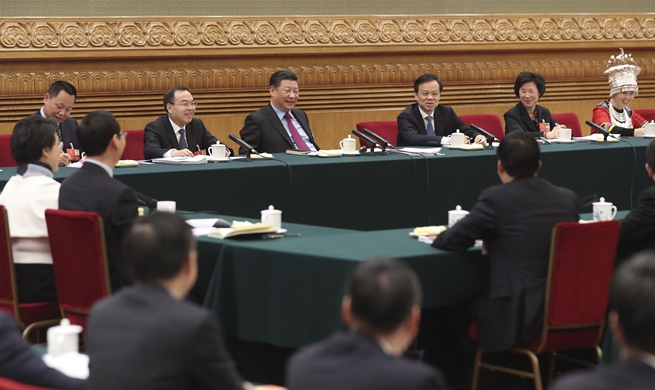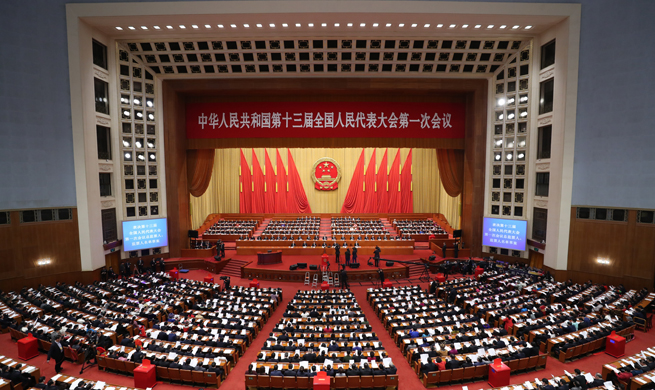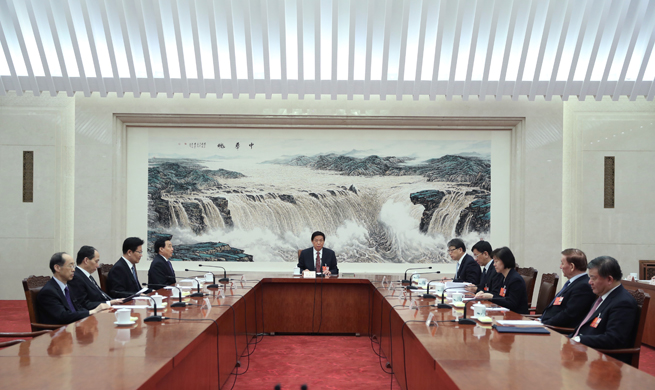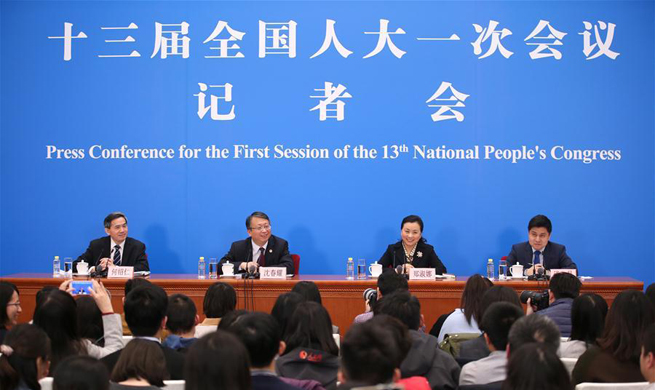BRUSSELS, March 11 (Xinhua) -- The talks between the European Union (EU) and the United States on U.S. President Donald Trump's imposition of controversial tariff on steel and aluminum imports seem to have got into a standoff, as top EU trade official puts the blame on the U.S. side.
The EU's Trade Commissioner Cecilia Malmstrom said Saturday that the United States has failed to provide full clarity on how the EU could be exempted from Washington's steel and aluminum tariffs, but said talks would continue next week.
"As a close security and trade partner of the United States, the EU must be excluded from the announced measures. No immediate clarity on the exact U.S. procedure for exemption however," Malmstrom tweeted after a trilateral meeting with U.S. Trade Representative Robert Lighthizer and Japanese Minister for Economy, Trade and Industry Hiroshige Seko in Brussels.
U.S.-EU TALKS IN STANDOFF
Saturday's meeting had been previously planned but took on greater importance because of Trump's announcement of a 25 percent tariff on steel imports and 10 percent on aluminum imports to "protect national security."
Brussels has gone the furthest in fighting back against U.S. stiff tariffs, threatening retaliatory levies on U.S. imports like peanut, bourbon, cranberries and orange juice, if the 28-nation bloc cannot be spared.
In announcing these measures, European Commission President Jean-Claude Juncker said the EU could match "stupid with stupid."
"The European Union, wonderful countries who treat the U.S. very badly on trade, are complaining about the tariffs on Steel & Aluminum," Trump tweeted Saturday.
"If they drop their horrific barriers & tariffs on U.S. products going in, we will likewise drop ours. Big Deficit. If not, we Tax Cars etc. FAIR!" he added.
Trump said Canada and Mexico have been spared for now, and other countries could also win exemptions as long as "their products no longer threaten our security."
The EU insists that it is committed to open, global trade. Malmstroem said the real problem is an oversupply of steel on global markets, and she rejected Trump's assertion that the tariffs are needed to protect U.S. national security, especially when most EU countries are members of NATO.
The EU, Japan and the United States have agreed to meet again in the margins of the Paris ministerial meeting of the Organization for Economic Cooperation and Development (OECD) to discuss overcapacity issues.
U.S. TARIFFS CONDEMNED WORLDWIDE
Trump's announcement of the U.S. tariff, which will take effect 15 days after he formally unveiled them Thursday, has sparked fears of a new trade war and has triggered global dissent.
"Nobody can win this kind of race," German Chancellor Angela Merkel told reporters Friday, adding that Germany would support the EU if it ultimately decided to adopt retaliatory measures, but called for diplomatic talks to resolve the trade conflict as a first resort.
Marina Whitman, professor emerita of business administration and public policy at the University of Michigan, said Trump's tariffs "are likely to raise prices of consumer goods containing aluminum or steel and, more important, will raise them for manufacturers whose products use aluminum and steel, making them less competitive."
"A lot more people are employed in the U.S. in companies using aluminum and/or steel in their products than in those making them," she said. Moreover, "it is a major step toward undermining the international rule of law in trade, which the U.S. took the lead in creating ever since WWII."
A recent study by Trade Partnership, a Washington, D.C.-based consulting firm, also estimated that Trump's new tariff on steel and aluminum would result in a net loss of 146,000 U.S. jobs after accounting for positive impacts on U.S. steel and aluminum producers.
Commenting on the U.S. policy, Canadian experts said it is a clear bargaining tool for Trump to pressure Canada in the ongoing North American Tree Trade Agreement (NAFTA) talks.
"Because other countries are subjected to these tariffs, it should actually increase demand for steel and aluminum from Canada," said James Brander, a trade expert at the University of British Columbia in Vancouver, Canada.
"Trump is using this (as) a tactic to try to put more pressure on Canada and Mexico to go along with some of the things the U.S. wants in the NAFTA negotiations," he added, "If it doesn't work, they will be included in the tariffs."
(Xinhua reporters Shuai Rong, Wang Zichen, Li Baodong, Xu Jing and Zhu Sheng also contributed to the story)















